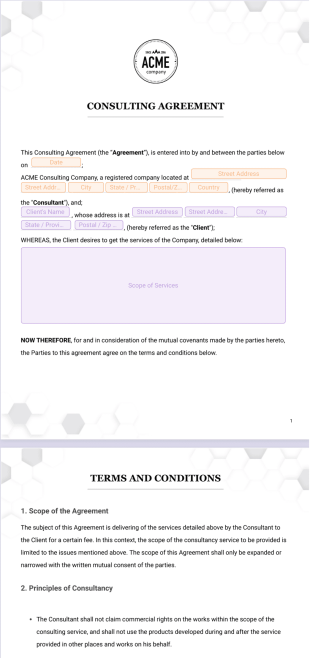Agreement Templates
About Agreement Templates
Written agreements are important in detailing a specific transaction made between two or more parties. Despite not always being legally enforceable in a court of law, they can often prevent disputes. From partnership agreements to separation agreements, Jotform's selection of Agreement Sign Templates will guide you in creating a paper trail for any type of business agreement. Your formal agreements will automatically be saved as secure PDFs that can easily be downloaded, shared with all involved parties, or printed for future reference.
These ready-made templates are formatted to provide contact information, terms and conditions, and instructions to resolve conflicts. You can collect electronic signatures with Adobe Sign or DocuSign and accept payments with integrated gateways such as PayPal or Square. Using Jotform’s PDF Editor, you can customize the template by rearranging the layout and rewriting the text to better specify each party’s obligations and protect the rights of all involved.
Frequently Asked Questions
1) What are agreement templates?
Agreement templates are documents that outline terms, conditions, and details about a transaction between two or more parties. These templates provide a structure that can be customized to suit various types of agreements, such as leases, payments, partnerships, consultancies, freelance work, and more. Agreement templates help individuals and businesses save time while providing a consistent set of terms for transactions. They may also provide some protection in cases of issues or disputes.
Agreement templates are especially useful for companies or individuals that lack the expertise and time required to draft agreements from scratch. They minimize the risk of errors, save money, and give you time back to focus on growing your business.
2) The subtypes of agreement templates
There are agreement templates for virtually every type of business agreement out there! Here are some of the more common use cases for agreements.
- Services: A service agreement is a document between a service provider and a client that outlines the terms and conditions of a service and covers details such as roles, cost, quality standards, etc.
- Leases: Lease agreements are contracts between a landlord and a tenant that outline the terms and conditions of a property rental. These agreements establish roles and responsibilities of both parties, so that they know what’s expected of them.
- Purchases: A purchase agreement is a document that finalizes the details of a pending sale between a buyer and seller. This agreement comes into play after the buyer and seller have arranged the sale of an item.
- Equipment rentals: An equipment rental agreement is a document that outlines the terms, responsibilities, and obligations of both the owner and renter in an equipment rental.
- Payments: A payment agreement is a document between a lender or provider and a borrower or client that outlines the terms and conditions of a loan, payment plan, or purchase. This typically includes the amount, payment schedule, and penalties.
- Maintenance: A maintenance agreement is a contract between a maintenance company and a customer that details the terms and conditions for scheduled maintenance services.
3) The key elements of agreement templates
Agreement templates vary according to the agreement type and circumstance, but typically they include these key elements.
- Essential information: This section includes names of the parties involved, the effective date of the agreement, contact phone numbers and emails, etc.
- Terms and conditions: This section lists different terms, conditions, and provisions relevant to the agreement, such as the timeline for project completion, how disputes will be resolved, and more.
- Responsibilities and obligations: This section includes all necessary information about the roles, responsibilities, and obligations of all parties involved.
- Payment terms: This section outlines the price and payment plan for the service or exchange being provided.
- Miscellaneous: This section lists any other clauses or terms relevant to the agreement.
- Signatures: This section provides space for signatures from all parties.
4) What makes an agreement different from a contract?
The primary difference between an agreement and a contract has to do with legal enforceability. An agreement is used to describe a mutual arrangement or understanding between parties — which can be either formal or informal. Agreements can take the form of documents, but they can also be made via email or in-person meetings.
By contrast, a contract is a more formal and legally binding document that is enforceable in court. It typically requires elements like clear clauses and terms, written records, and the establishment of a relationship between parties. While agreements may not carry the same weight in the legal system, they can still be useful in business partnerships. When choosing between an agreement and a contract, the nature of the arrangement will help you determine which one to use.
5) How do I create an agreement with Jotform?
You can create an agreement with Jotform in no time using our ready-made templates. Navigate to Agreement Templates in our form template library, and choose a template that fits your purpose and needs. Use our simple drag-and-drop form builder to customize the agreement with your own terms and conditions, elements of your personal branding, different fonts and colors, widgets and integrations, and much more. When your agreement looks good to go, you can share it with your clients via email, link, or QR code. Plus, collect signatures on any device and save your agreement as a PDF in the data storage platform of your choice. It’s that easy!
These templates are suggested forms only. If you're using a form as a contract, or to gather personal (or personal health) info, or for some other purpose with legal implications, we recommend that you do your homework to ensure you are complying with applicable laws and that you consult an attorney before relying on any particular form.




























